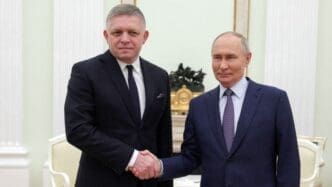In a move that underscores current geopolitical shifts, Russian President Vladimir Putin met with Slovakia’s Prime Minister Robert Fico in Moscow. This marks one of the few instances in which a leader from the European Union has visited the Kremlin since the escalation of the Ukraine conflict in February 2022.
The meeting between President Putin and Prime Minister Fico occurred on a ‘working visit,’ as described by Kremlin spokesman Dmitry Peskov. The agenda predominantly focused on ‘the international situation’ and the continued delivery of Russian natural gas to Europe, particularly Slovakia. Despite ongoing tensions, Russian gas has continued to flow through Ukraine to certain European nations under a five-year agreement that will soon expire.
According to Ukrainian President Volodymyr Zelenskyy, Kyiv plans to terminate the gas transit agreement, a stance that could impact Slovakia negatively, as emphasized by Prime Minister Fico at a recent summit in Brussels. Slovakia has been exploring alternatives, such as signing a short-term pilot deal to purchase gas from Azerbaijan and importing U.S. liquefied natural gas via Poland. The country is also diversifying its supply through other European networks.
Visits to Moscow by EU leaders have been infrequent since the beginning of the war in Ukraine. The meeting between Fico and Putin follows rare visits by Hungary’s PM Viktor Orbán and Austrian Chancellor Karl Nehammer, both of whom faced criticism from Kyiv and European leaders. Orbán, in particular, has been noted for maintaining relatively close ties with Putin.
Fico’s political stance diverges significantly from most European leaders. Having reclaimed power last year on a pro-Russia and anti-American platform, he has ceased Slovakia’s military aid to Ukraine and criticized EU sanctions against Russia. He has also declared his opposition to Ukraine’s potential NATO membership and appeared on Russian state television.
In a contentious interview on Russia’s Rossiya-1 channel, Fico argued that Western support for Ukraine has extended the conflict and claimed sanctions on Russia are ineffective. He expressed readiness to negotiate with Putin and announced plans to attend Moscow’s military parade next May commemorating World War II’s end.
This visit highlights Prime Minister Fico’s ongoing support for engaging with Russia despite the broader EU’s stance. The regular ‘Victory Day’ celebrations in Russia, where Putin has praised his military’s efforts in Ukraine, serve as a backdrop to Fico’s diplomatic expressions.
Prime Minister Fico’s visit to Moscow underscores his distinct position within EU politics, highlighting Slovakia’s delicate balance between its European ties and its need for Russian energy. This diplomatic engagement with President Putin also reflects the enduring complexities of European energy dependencies and geopolitical alignments in the current era.








